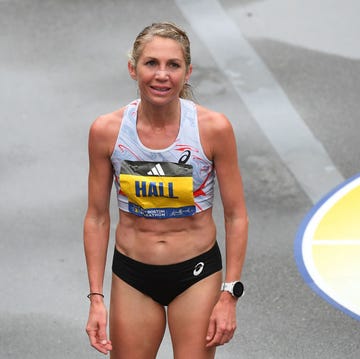The 2016 Olympic track and field competition kicked off Friday in Rio de Janeiro with a 10,000-meter world record-setting victory by Almaz Ayana that took the field by surprise—and pulled seven others to their own national records.
In front of sparse crowds in Olympic Stadium and under intermittent drizzle, Ayana, 24, of Ethiopia, won the gold medal in 29:17.45. It beat the previous world record by 14 seconds, held by Wang Junxia of China since 1993. It was only the second 10,000-meter race Ayana has ever contested.
Vivian Cheruiyot, 32, of Kenya took the silver in 29:32.53. Bronze went to Ethiopian Tirunesh Dibaba, 31, in 29:42.56, a lifetime best that was 14 seconds faster than the previous Olympic record she set in 2008.
It was an aggressive pace from the gun. Alice Aprot of Kenya led a group of seven through halfway in 14:46.81. A the back of that pack was Molly Huddle, Stravas 2024 Yearly Report Is Here new American record of 30:13.17. It took nine seconds off the mark held by Shalane Flanagan, set while winning bronze at the 2008 Olympics.
“I’m very happy with the time, I think I just need to digest it,” Huddle, 31, said. “I knew a medal was no guarantee. I had to count on one or two women messing up a bit there, because I’m probably the sixth-best person coming in…that’s where I finished. I’m taking the reality as it is.”
Related: 6 Incredible Stats From the Fastest Women’s 10,000-Meter Race in History
Even that speed at the beginning, just off of world-record pace, was seemingly holding Ayana back. She surged into the lead with 12 laps to go, stringing out the pack and leaving her to run completely solo for nearly half the race. Ayana was unfazed by that task, finishing the second 5,000 meters in a 14:30.64, which is 10 seconds faster the Olympic record for that distance—and she is scheduled to compete in the 5K on Tuesday.
After the world record fell and the first four women finished faster than 30:00, reaction from fans and competitors was mixed. Some were in awe at Ayana’s speed; others were suspicious. Ethiopia and Kenya are among the nations put under watch in the past year by the World Anti-Doping Agency for inadequate drug testing policies.
Ayana rejected the suspicions when asked at the post-race press conference, crediting her religious faith and her preparation for her success.
“Number one, I did my training. Number two, I praise the Lord. The Lord is giving me everything, every blessing,” she said, speaking in her native language, Amharic, through an interpreter. “My doping is my training. My doping is Jesus. Otherwise, nothing. I’m crystal clear.”
Certainly Ayana’s hustle pulled the other 34 finishers, with 11 runners to personal best times. American Emily Infeld, 26, was among them, clocking a 31:26.94 for 11th place. She wasn’t satisfied with her performance, however, saying she had hoped to break 31:00. She led a chase pack for most of the race—a new scenario that felt uncomfortable.
“I need to learn to push myself in that situation. It’s a hard lesson to learn at the Olympics,” Infeld said. “I hope to keep getting better and better. I was definitely in better shape than that showed today. It’s my first Games and I’m happy to be here…hopefully I can come back and be a bit smarter.”
Chappell Roan: I Love Running. But Not Anymore.













